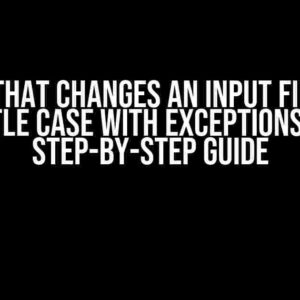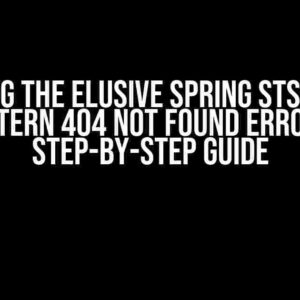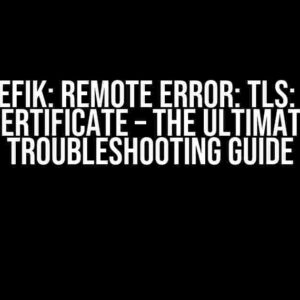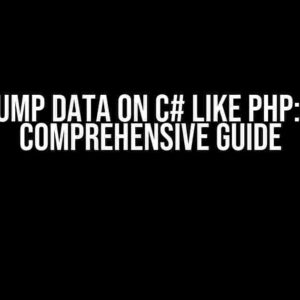Are you tired of banging your head against the wall trying to convert an Object[] to a DateTime type in C#? You’re not alone! The infamous “Cannot convert the ‘System.Object[]’ value of type ‘System.Object[]’ to type ‘System.DateTime'” error has frustrated many a developer. Fear not, dear reader, for we’re about to embark on a journey to vanquish this pesky issue once and for all.
Understanding the Problem
The error occurs when you try to assign an array of objects (Object[]) to a DateTime variable or parameter. This is because the compiler has no idea how to magically convert an array of objects into a single DateTime value. It’s like trying to fit a square peg into a round hole – it just ain’t gonna work!
Why Does This Happen?
There are a few reasons why you might encounter this error:
- Working with dynamic data: When working with dynamic data sources, such as databases or APIs, you might receive an array of objects instead of a single value.
- Method parameter mismatch: If a method expects a DateTime parameter, but you pass an Object[] instead, the compiler will throw this error.
- Implicit casting attempts: Attempting to implicitly cast an Object[] to a DateTime using the
asorConvert.ToDateTime()keywords will also result in this error.
Converting Object[] to DateTime: Solutions Galore!
Now that we’ve identified the problem, let’s explore some solutions to convert an Object[] to a DateTime type in C#:
Solution 1: Casting and Indexing
If you know that the Object[] contains a single DateTime value, you can try casting and indexing:
Object[] myArrayOfObjects = GetArrayOfObjects();
DateTime myDateTime = (DateTime)myArrayOfObjects[0];
This solution assumes that the Object[] contains only one element, which is a DateTime value. If the array contains multiple elements or the element is not a DateTime, this will throw an exception.
Solution 2: LINQ and Casting
Using LINQ, you can cast the Object[] to a DateTime and retrieve the first element:
Object[] myArrayOfObjects = GetArrayOfObjects();
DateTime myDateTime = myArrayOfObjects.Cast<DateTime>().FirstOrDefault();
This solution is more robust than the previous one, as it will return the first DateTime value in the array, or the default value (DateTime.MinValue) if no DateTime values are present.
Solution 3: Using a Loop and Checking Types
If you’re not sure what type of objects are in the array, you can use a loop to iterate over the elements and check their types:
Object[] myArrayOfObjects = GetArrayOfObjects();
DateTime myDateTime = default(DateTime);
foreach (object obj in myArrayOfObjects)
{
if (obj is DateTime dateTime)
{
myDateTime = dateTime;
break;
}
}
This solution is more flexible, as it will iterate over the entire array and retrieve the first DateTime value it finds. If no DateTime values are present, it will leave the myDateTime variable unchanged.
Solution 4: Using a Custom Method
You can also create a custom method to convert an Object[] to a DateTime:
public static DateTime GetDateTimeFromObjectArray(Object[] objects)
{
foreach (object obj in objects)
{
if (obj is DateTime dateTime)
{
return dateTime;
}
}
return default(DateTime);
}
This solution encapsulates the logic of converting an Object[] to a DateTime into a reusable method. You can then call this method whenever you need to perform this conversion.
Best Practices and Additional Tips
When working with Object[] and DateTime conversions, keep the following best practices in mind:
- Use explicit casting: Avoid implicit casting using the
askeyword, as it can lead to runtime errors. - Check for null and empty arrays: Before attempting to convert an Object[] to a DateTime, check if the array is null or empty to avoid exceptions.
- Use LINQ wisely: LINQ can be a powerful tool, but it can also lead to performance issues if used excessively.
- Test and debug: Verify your code using unit tests and debuggers to ensure that it behaves as expected.
Conclusion
In conclusion, converting an Object[] to a DateTime type in C# can be a challenge, but with the right solutions and best practices, you can overcome this hurdle. Remember to understand the problem, use the right solution for your specific scenario, and follow best practices to ensure your code is robust and maintainable.
| Solution | Description |
|---|---|
| Casting and Indexing | Cast and index the Object[] to retrieve the first DateTime value. |
| LINQ and Casting | Use LINQ to cast the Object[] to a DateTime and retrieve the first element. |
| Loop and Checking Types | Iterate over the Object[] and check each element’s type to retrieve the first DateTime value. |
| Custom Method | Create a custom method to convert an Object[] to a DateTime. |
By following the guidelines and solutions outlined in this article, you’ll be well on your way to mastering the art of converting Object[] to DateTime in C#. Happy coding!
Frequently Asked Question
Error messages can be frustrating, but don’t worry, we’ve got you covered! Here are some frequently asked questions and answers about converting Object[] to date type and resolving the error “Cannot convert the “System.Object[]” value of type “System.Object[]” to type “System.DateTime””.
What is causing the error “Cannot convert the “System.Object[]” value of type “System.Object[]” to type “System.DateTime””?
This error occurs when you’re trying to convert an array of objects (Object[]) to a single DateTime value. The error message is indicating that it cannot directly convert an array of objects to a DateTime type.
How do I fix this error?
To fix this error, you need to iterate through the Object[] array and convert each object to a DateTime value individually. You can use a foreach loop or LINQ to achieve this.
Can I use the Cast method to convert the Object[] to a DateTime array?
Yes, you can use the Cast method to convert the Object[] to a DateTime array. For example, `DateTime[] dateTimeArray = objectArray.Cast
What if the Object[] array contains null values?
If the Object[] array contains null values, you’ll need to handle them before converting to DateTime. You can use a null check or the nullable DateTime type (DateTime?) to handle null values.
Are there any performance implications when converting a large Object[] array to a DateTime array?
Yes, converting a large Object[] array to a DateTime array can have performance implications. It’s recommended to use efficient iteration methods and consider using parallel processing or async methods if necessary.

![Conquering the Frustrating “Cannot convert the ‘System.Object[]’ value of type ‘System.Object[]’ to type ‘System.DateTime'” Error Conquering the Frustrating “Cannot convert the ‘System.Object[]’ value of type ‘System.Object[]’ to type ‘System.DateTime'” Error](https://kiyari.hkhazo.biz.id/wp-content/uploads/sites/329/2024/07/conquering-the-frustrating-cannot-convert-the-system-object-value-of-type-system-object-to-type-system-datetime-error-with-text.jpg)





